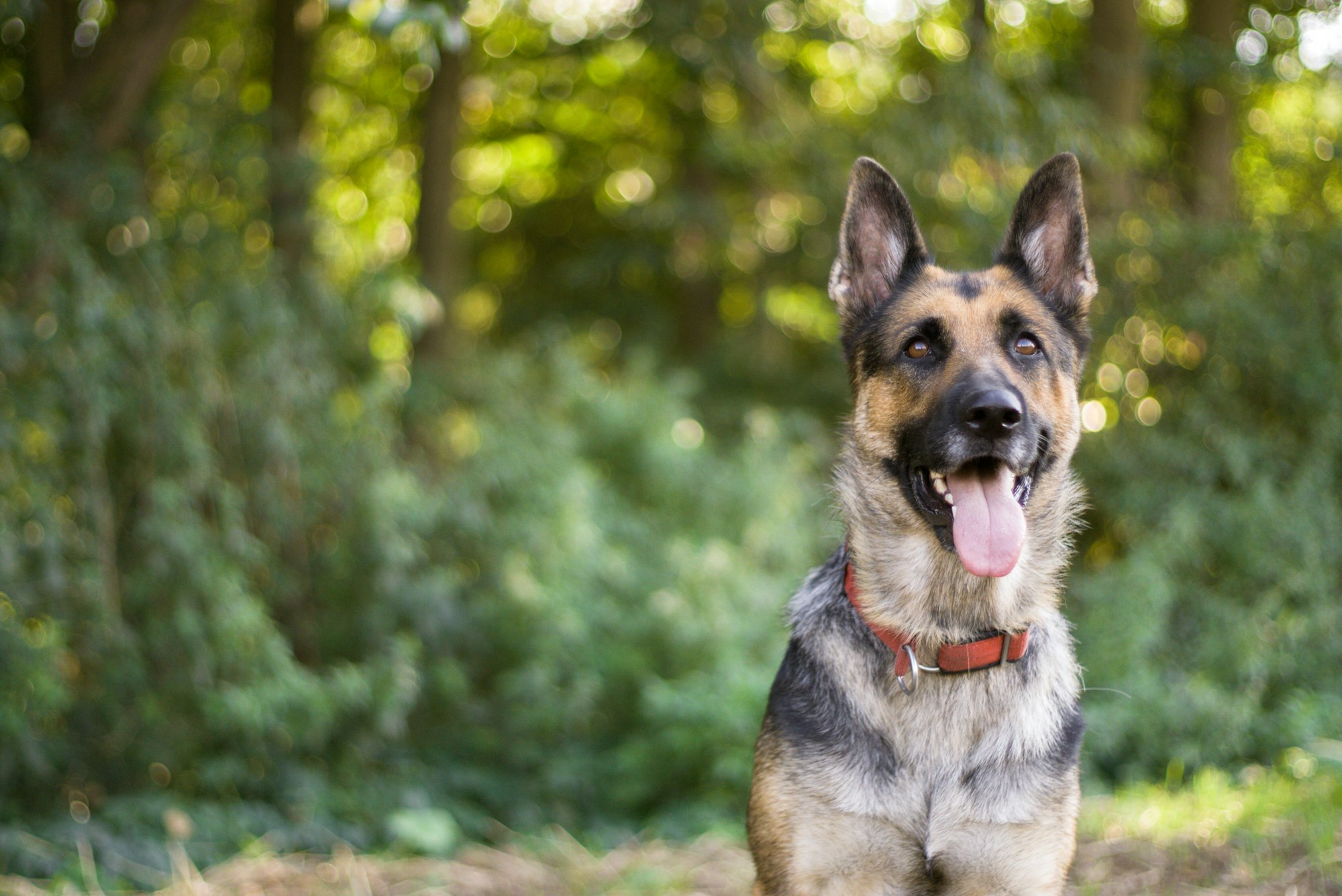Renowned for their sharp intellect and unwavering loyalty, German Shepherds stand out as exceptional pets. For those committed to the well-being of their furry friends, grasping the elements that influence their lifespan is fundamental. These agile and dedicated dogs have won over countless hearts with their multifaceted capabilities and steadfast commitment.

It's imperative for conscientious guardians to investigate what shapes the life expectancy of these extraordinary breeds. Embark with us as we unravel the vital secrets that pave the way for a prolonged and thriving existence for your German Shepherd. Join us in a comprehensive exploration of the three pivotal factors that profoundly impact the life span of these distinguished canines.
Diet and Physical Activity: The Cornerstones of Health for German Shepherds
The pivotal role of nutrition in the health and longevity of German Shepherds cannot be overstated. A balanced diet tailored to their unique nutritional requirements is paramount for their well-being. Here are essential strategies to ensure your German Shepherd receives the best possible nutrition:
Veterinary Consultation for Personalized Nutrition Plans
Engage with a veterinarian to devise the most suitable diet plan for your German Shepherd, taking into account factors like age, weight, and activity levels to craft a custom nutrition strategy.
Selecting Premium Dog Food
Opt for premium dog food designed for large breeds, ensuring the primary ingredient is high-quality meat. Avoid products laden with unnecessary fillers or artificial additives to ensure purity and nutritional integrity.
Protein-Rich Diet for Optimal Health
A diet abundant in high-quality protein is vital for muscle maintenance and overall vitality. Choose dog food with significant animal-based protein to support your German Shepherd's health needs.
Inclusion of Essential Fatty Acids
Integrate omega-3 and omega-6 fatty acids into your pet's diet to promote a lustrous coat, cognitive health, and a robust skin barrier, contributing to their overall health and appearance.
Portion Control to Avoid Obesity
Regulate feeding portions to prevent overfeeding, a leading cause of obesity and its associated health risks, such as joint issues and shortened lifespan. Adhere to the manufacturer's feeding guidelines for optimal health.
Ensuring Adequate Hydration
Access to clean, fresh water is essential for your German Shepherd, supporting vital functions like digestion and nutrient uptake, and overall health.
Alertness to Dietary Sensitivities
Stay vigilant for signs of food allergies or sensitivities, such as skin irritations or digestive disturbances. Consult your vet for dietary adjustments if needed.
Life Stage-Specific Feeding
Adapt your German Shepherd's diet to their current life stage, as puppies, adults, and seniors have varying nutritional needs. Select dog food formulas that address the specific requirements of each stage.
Avoiding Toxic Foods
Be aware of foods that are dangerous for dogs, such as chocolate, onions, and grapes, and ensure these are kept out of your pet's reach to prevent accidental ingestion.
Ongoing Nutritional Assessment
Regularly evaluate your German Shepherd's weight and overall condition, adjusting their diet in consultation with your vet, especially if there are changes in their activity levels or health status.
By prioritizing a well-balanced diet and regular exercise, you're laying the foundation for a healthy, vibrant life for your German Shepherd, ensuring they remain a joyful and active member of your family for years to come.

Optimizing Your German Shepherd's Well-being with Exercise
German Shepherds thrive on an active lifestyle to maintain their agility and well-being. Here's a concise guide to providing the right amount of exercise for your dog:
- Daily Walks: Essential for both physical and mental health, aim for 30 to 60 minutes of walking each day, adjusting for your dog's age and health.
- Engaging Play: Use dynamic play, like fetch and agility drills, to stimulate your German Shepherd physically and mentally.
- Off-Leash Freedom: Safe, secure areas for off-leash play encourage exploration and play, crucial for their happiness and fitness.
- Mental Stimulation: Incorporate puzzle toys and training exercises to keep their minds active and prevent boredom.
- Swimming: A low-impact exercise ideal for older dogs or those with joint issues, providing a full-body workout without added stress.
- Consistent Routine: A regular exercise schedule helps maintain stability and well-being.
- Age-Appropriate Activities: Adjust the intensity and type of exercise based on your dog's age and physical capabilities.
- Monitor During Exercise: Watch for signs of discomfort or fatigue and consult your vet as needed.
- Socialization: Encourage interactions with other pets and people to develop social skills and happiness.
- Regular Health Checks: Vet visits are crucial for assessing physical condition and tailoring exercise accordingly.
Combining regular exercise with a balanced diet ensures a healthy and fulfilling life for your German Shepherd, catering to their unique needs for a joyful existence.

Healthcare and Regular Vet Check-ups
Maintaining the health of your German Shepherd requires a proactive approach, including regular vet check-ups and preventive healthcare measures. Here's how to ensure your furry friend receives the best possible medical care:
Establish a Veterinary Relationship
Choose a reputable veterinarian who specializes in or has experience with large breeds like German Shepherds. Establishing a strong relationship with your vet enables better communication and comprehensive care.
Vaccinations and Preventive Medications
Adhere to a regular vaccination schedule to protect your German Shepherd against common canine diseases. Additionally, discuss and implement preventive medications for parasites, including fleas, ticks, and worms.
Dental Care
Include dental care as part of your routine. Regular tooth brushing, dental chews, and professional dental cleanings when necessary contribute to good oral health, preventing dental issues that could affect overall well-being.
Regular Check-ups
Schedule regular veterinary check-ups, ideally at least once a year for healthy dogs. Senior dogs or those with pre-existing conditions may require more frequent visits. These check-ups allow early detection of potential health issues.
Monitoring Weight and Nutrition
Regularly monitor your dog's weight and nutritional needs. Obesity can lead to various health problems, and adjustments to the diet may be necessary based on age, activity level, and overall health status.
Blood Tests and Diagnostic Screenings
Consider routine blood tests and diagnostic screenings as part of senior wellness check-ups. These tests help identify issues such as kidney disease, liver problems, or hormonal imbalances that may not be immediately apparent.
Eye and Ear Examinations
Include thorough eye and ear examinations in veterinary check-ups. German Shepherds can be prone to certain eye conditions, and regular checks ensure early detection and appropriate management.

Monitoring Joint Health
German Shepherds are susceptible to joint issues like hip dysplasia. Regular monitoring of joint health, especially in senior dogs, can lead to early intervention and improved quality of life.
Allergies and Skin Conditions
Be attentive to any signs of allergies or skin conditions. German Shepherds may be prone to skin issues, and timely veterinary attention can address underlying causes and provide relief.
Behavioral Assessments
Discuss any changes in behavior or temperament with your vet. Behavioral shifts could indicate underlying health problems, and early identification allows for prompt intervention and appropriate care.
Common Health Issues in German Shepherds
While German Shepherds are generally healthy dogs, they can be predisposed to certain health issues. Being aware of these common conditions enables proactive care and early intervention:
Hip Dysplasia
Hip dysplasia is a genetic condition where the hip joint doesn't fit properly into the hip socket. Regular exercise, a balanced diet, and weight management can help mitigate the impact of hip dysplasia.
Degenerative Myelopathy
This neurodegenerative disease affects the spinal cord, leading to hind limb weakness. While there is no cure, early detection allows for supportive care and interventions to maintain mobility.
Exocrine Pancreatic Insufficiency (EPI)
EPI can lead to poor digestion and malnutrition. It is manageable through enzyme supplementation and a well-balanced diet tailored to the dog's needs.
Dermatologic Issues
German Shepherds may be prone to skin allergies and conditions. Regular grooming, a high-quality diet, and addressing any allergens in the environment can help manage skin health.
Hemophilia
Some German Shepherds may inherit a bleeding disorder called hemophilia. Prompt veterinary attention is crucial if you notice excessive bleeding, bruising, or difficulty clotting.

Bloat (Gastric Dilatation Volvulus)
Bloat is a life-threatening condition where the stomach fills with gas and twists on itself. Feed smaller meals, avoid strenuous exercise after meals, and be vigilant for signs of bloat, such as a distended abdomen.
Pancreatitis
Pancreatitis, inflammation of the pancreas, can occur. Avoid feeding high-fat diets, and be cautious with table scraps to prevent triggering pancreatitis.
Epilepsy
Some German Shepherds may experience seizures due to epilepsy. Medication and careful management, under the guidance of a veterinarian, can help control seizures.
Osteoarthritis
Joint issues, including osteoarthritis, can affect aging German Shepherds. Regular veterinary check-ups, weight management, and joint supplements can help support joint health.
Heart Conditions
Certain heart conditions may affect German Shepherds. Regular veterinary assessments, including heart screenings, can aid in early detection and management.
By prioritizing preventive healthcare and staying informed about breed-specific health concerns, you can enhance the quality of life for your German Shepherd. Regular vet check-ups and proactive measures contribute to a healthier and longer life for your cherished companion.
Living Conditions and Quality Breeding
The environment and living conditions play a crucial role in the well-being and happiness of your German Shepherd. Providing a safe and comfortable space contributes to their overall quality of life. Here's how to create an optimal living environment:
Adequate Shelter
Ensure your German Shepherd has access to a sheltered and comfortable living space. This can be a well-insulated dog house, a dedicated indoor area, or a combination of both. Protection from extreme weather conditions is essential for their health and comfort.
Sufficient Space
German Shepherds are active and energetic dogs that require ample space to move around. Whether indoors or outdoors, provide enough room for them to exercise, play, and explore. Insufficient space can lead to boredom and behavioral issues.
Safe and Secure Fencing
If your German Shepherd spends time outdoors, install secure fencing to prevent them from wandering off or encountering potential dangers. A fenced yard allows them to enjoy outdoor activities safely.
Comfortable Bedding
Offer comfortable bedding, both indoors and outdoors. Quality dog beds provide support for joints and muscles, ensuring a good night's sleep and overall well-being.
Regular Access to Fresh Air
Ensure your German Shepherd has regular access to fresh air. Outdoor time allows them to experience natural stimuli, engage their senses, and maintain mental stimulation.

Proper Ventilation
Whether indoors or in a dog house, ensure proper ventilation to prevent overheating and ensure a comfortable living environment. Good air circulation is crucial for their respiratory health.
Adequate Lighting
Provide sufficient lighting in indoor spaces. Natural light is ideal, but if that's not possible, ensure that artificial lighting is bright enough to create a well-lit and inviting atmosphere.
Safe and Stimulating Toys
Enrich your German Shepherd's environment with safe and stimulating toys. Puzzle toys, chew toys, and interactive games help prevent boredom and encourage mental stimulation.
Clean Living Space
Maintain a clean living space for your German Shepherd. Regular cleaning and removal of waste prevent the buildup of bacteria and parasites, contributing to their overall health.
Temperature Control
Ensure that the living environment remains within a comfortable temperature range. Avoid exposing your German Shepherd to extreme heat or cold, and provide shade and shelter accordingly.
Quality Breeding Practices
The quality of breeding directly impacts the health and well-being of German Shepherds. Responsible breeding practices contribute to the prevention of genetic disorders and ensure a healthier lineage. Here's what to look for when choosing a breeder:
Health Screening
Reputable breeders conduct thorough health screenings for breeding dogs. This includes screening for genetic conditions common in German Shepherds, such as hip dysplasia, elbow dysplasia, and degenerative myelopathy.
Genetic Testing
Ensure that the breeder performs genetic testing on their breeding dogs to identify any potential hereditary issues. This proactive approach helps reduce the risk of passing on genetic disorders to the offspring.

Knowledgeable Breeder
Choose a breeder with a deep understanding of the German Shepherd breed. Knowledgeable breeders are aware of breed-specific traits, temperament, and health considerations, allowing them to make informed breeding decisions.
Ethical Breeding Practices
Responsible breeders prioritize the health and well-being of the dogs over profit. They adhere to ethical breeding practices, including proper care for breeding pairs, appropriate breeding age, and limited breeding frequency.
Socialization and Exposure
Quality breeders expose puppies to various stimuli and socialization experiences from an early age. This contributes to the development of well-adjusted and socially adept dogs.
Transparent Communication
A reputable breeder maintains transparent communication. They willingly provide information about the puppy's lineage, health records, and any potential challenges. Open communication builds trust between the breeder and the new owner.
Commitment to the Breed Standard
Choose a breeder committed to the breed standard set by kennel clubs. This ensures that the puppies exhibit the desired physical and behavioral traits characteristic of the German Shepherd breed.
Responsible Rehoming Practices
Quality breeders prioritize responsible rehoming practices. They carefully screen potential owners, ensuring that the puppies are placed in loving and suitable homes with owners who can meet their needs.
Breeder's Reputation
Research the breeder's reputation within the dog breeding community. Positive reviews, recommendations, and a commitment to the welfare of their dogs are indicators of a reputable breeder.
Lifelong Support
A responsible breeder provides ongoing support to puppy owners. They offer guidance on health care, training, and any questions that may arise throughout the dog's life.
Choosing a breeder who prioritizes the health and well-being of their dogs is essential for bringing a healthy and happy German Shepherd into your family. Responsible breeding practices contribute to the long-term health and vitality of the breed.

Conclusion
In conclusion, the key factors influencing a German Shepherd's lifespan are interconnected and require a holistic approach to care. From genetics to grooming, and from nutrition to emotional well-being, every aspect plays a crucial role. By understanding and implementing these factors, you can contribute to ensuring a long, healthy, and joyful life for your cherished German Shepherd.
FAQs
- Q: How can I choose the right diet for my German Shepherd?
- A: Consult with your veterinarian to determine a diet that aligns with your dog's age, activity level, and health condition.
- Q: Are there specific exercises suitable for older German Shepherds?
- A: Low-impact exercises like swimming and gentle walks are beneficial for older dogs. Consult with your vet for personalized recommendations.
- Q: What signs should I look for in common health issues?
- A: Watch for symptoms like lethargy, changes in appetite, and unusual behaviors. Regular vet check-ups aid in early detection.
- Q: How often should I groom my German Shepherd?
- A: Regular grooming, including brushing and nail trimming, should be done at least once a week to maintain their coat and overall health.
- Q: Can training really impact a dog's lifespan?
- A: Yes, training not only shapes behavior but also fosters a strong bond, contributing to a happy and extended life.

